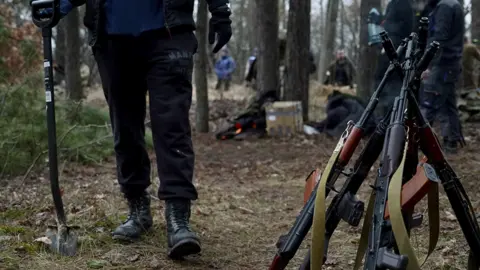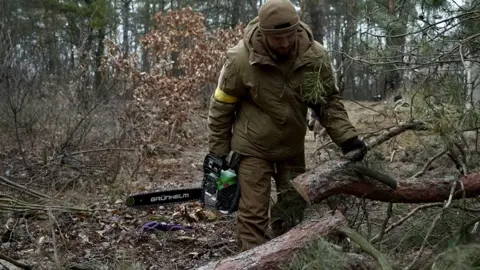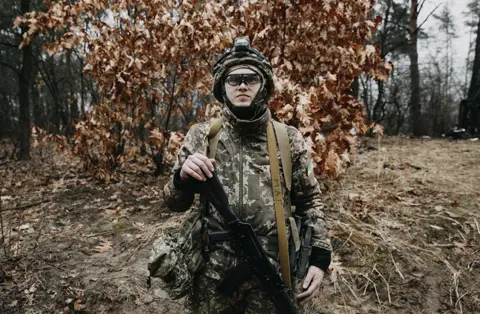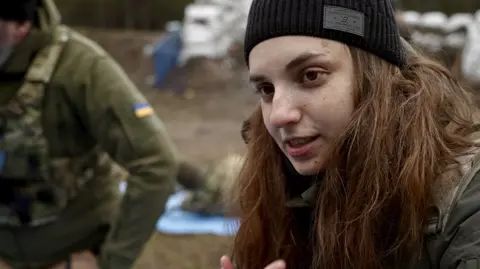Ukraine: Amateurs dig in to fight Russian troops from Kyiv forests
 BBC
BBCDay by day, Kyiv grows more tense.
Checkpoints, barricades, and roadblocks radiate from the imposing streets in the city centre to the motorways on the outskirts. Spiky metal tank traps - called hedgehogs - have mushroomed at strategic locations. Troops are more alert, checking every car. Some still smile and say "welcome", but many look distracted, already focusing on the battle to come.
It feels like Ukrainian forces in the capital are poised and ready to fight. This ancient city - with its elegant facades and onion domed churches - is now on a war footing.
Russia's advance has clearly not gone to plan for President Vladimir Putin. With the invasion now in its second week, his troops and tanks are still outside the capital - but maybe not for long. Ukrainian forces we spoke to on Thursday expect the Russians to reach Kyiv in a day or two.
So, deep in a forest on the outskirts of the city, men from Ukraine's territorial defence units are digging trenches.
"Welcome to our party," said the soldier who dropped us off, after a bumpy ride in the back of a military truck full of ammunition boxes.

The scene is somehow reminiscent of World War Two. There's no heavy machinery, just a shovel in every hand. It's a rush job to block the path of Russian forces. We cannot identify the location. One man wields a chainsaw, doing battle with a stubborn pine tree.
Mykhailo blends in with the forest. The 25-year-old computer programmer stands proud, in full camouflage gear. He joined a territorial defence unit earlier this year and got just a few days of training, but he insists he's combat ready.
"I am not afraid," he said firmly. "We are prepared, and we have a lot of powerful guys there. There is a big possibility that the Russians won't even come here. I am very confident in our armed forces. If the Russians make it this far, we will push them out."

Nearby, others - both veterans and younger volunteers - were getting a crash course in battlefield first aid. They were being shown how to apply a tourniquet to their own limbs, or to someone else's, while flat on the ground. The aim is to prevent catastrophic blood loss, a leading cause of death in war.
"They should know how they can save themselves, and save their friends," said Olga, who has long brown hair under a black woollen cap. "We don't have time to show them everything, so we are showing the most important thing." She's not a paramedic herself - she works in procurement - but she is passing on what she knows. As we spoke, she was distracted by a sudden gunshot.
She expects today's lesson could soon be put into practice, if and when Russian forces breach the city. "Unfortunately, I think it's a few days and we are afraid. But it's our town, it's our country and we must fight."

Since the invasion began eight days ago, many Ukrainians have queued in freezing temperatures to volunteer for territorial defence units in Kyiv. We met Denys, a 36-year-old lawyer and anti-corruption activist, queuing under a light snowfall.
"I am preparing to fight for my motherland with my friends," he said. "Now we are warriors, and we will defend the country from the aggressor, the occupier. We will fight to the last drop of our blood."
Like many here, he believes there is far more at stake than the future of Ukraine. "We will fight to the end, and we will win," he said. "We have no choice because this is fight for democracy, for freedom, for human rights. We will fight for Ukraine, for Europe, and for the world."
There was camaraderie in the queue with offers of hot tea from flasks, and coffee with banana milk, as fresh milk is now very hard to come by.
A burly 28-year-old called Pavlo told me that if he could not get a weapon - as they are in short supply - he would "kill the invaders with his bare hands". Eight days ago, he was a manager in a shop.
"This is my city," he said. "I know every street, rock, building and tree. I will defend this city. My family are here. I know where they are hiding. The only option is to win."

More coverage of war in Ukraine
- LIVE: Latest updates from on the ground
- THE BASICS: Why is Putin invading Ukraine?
- RUSSIA: Watching the war on TV
- UKRAINE: 'I have never felt so much love for my homeland'
- IN DEPTH: Full coverage of the conflict

For others in the city, there is still a sense of profound shock that Moscow has stormed on to Ukrainian soil and is trying to seize the capital.
"You don't expect this from a neighbour," said Lilya Romanova, a 39-year-old sales director and mother of two young daughters. We met at her neighbourhood bomb shelter.
"We had never thought we would have to explain to our children what war is," she said, "and that Russia is the aggressor. We used to teach our children to speak Russian, but not any more. Now there is only the Ukrainian language. Even my grandmother is learning it now, at 90 years of age."
The soundtrack of the city is now a surreal mix of silence and sirens, punctuated by the thud of explosions, especially at night. Checkpoints are starting to outnumber hipster coffee shops. "It's like 'Call of Duty - Ukraine'," said our young translator.
Kyiv feels like a battleground in waiting.
